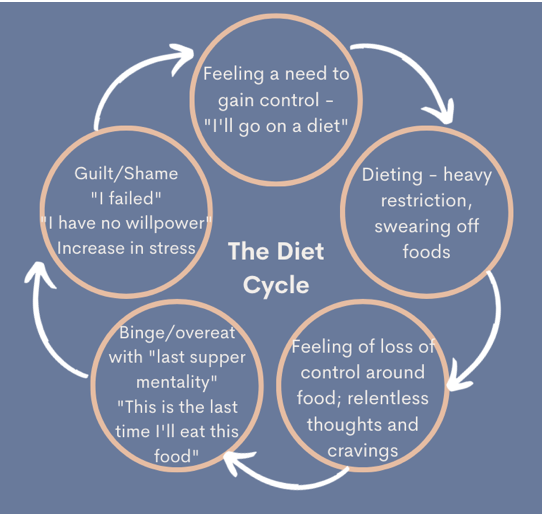Gut HEALTH
GI-MAP Stool Testing
F*ck Your Diet Intuitive Eating Program
coaching program
Intuitive Eating Counseling
Eating Disorder Recovery
1:1 Nutrition counseling
Services
Check out my intuitive eating coaching program!
Want more support?
Blog Categories
In this free course, you’ll get a step-by-step approach to uncover why you feel addicted to sugar and what you can do to reclaim your relationship with carbohydrates.
Stop Feeling Addicted to Sugar
Free Course
I'm here to help you find food freedom and feel more confident in your body!
Hey, I'm Ellen
Why am I not losing weight on my diet?
Filed under:
If you’ve been on a weight loss or wellness journey, dedicating TONS hours to dieting, obsessing over your food choices, supplements, detoxes, and exercising, only to find that you’re not losing weight, you’re not alone. Here are some pretty staggering statistics about how poorly diets really work in the long run:
How Many Diets Fail and By How Much
Data from The Journal of Clinical Nutrition, provided by volunteers:
- After one year, 35% of people regain at least 5 lbs.
- 59% maintain their weight.
- Only 6% continue to lose weight.
- Maintaining weight loss for 2 consecutive years decreases weight gain odds by 50%.
- People with no medical event triggering weight loss regain weight 50% more than those with a medical event
And then there is THIS data based on thousands of participants recorded by the Medical Clinics of North America:
- More than half of all weight lost in diets is regained within 2 years.
- By year 5, more than 80% of all weight lost is regained.
In our diet and body-obsessed culture, the pressure and struggle to lose weight can be incredibly frustrating and can make you feel like a failure. But the fact is – YOU are not the failure. The diets do not work. In fact, long term dieting could be seriously harming you. Instead of continuing on the diet cycle, I want to share with you why traditional diet and exercise approaches may not have yielded the weight loss results you hoped for, and introduce you to a more sustainable and holistic approach to nutrition instead.
The Diet Cycle Impact on Losing Weight
Does this look familiar?

This image is the classic diet cycle that so many people suffer their way through, only to keep dieting because they think they just need to be BETTER at dieting, rather than realizing that the diets are designed to fail.
The Weight Loss Plateau
Okay, first, it’s important for you to understand why weight loss plateaus happen because I have people tell me, “clearly diets DO work! I lost weight at first but then stopped… so, obviously I did something wrong.” When you initially start a traditional diet and exercise regimen, you may experience rapid weight loss due to water loss and initial changes in dietary patterns. However, the human body is incredibly adaptable and tends to resist drastic changes in weight over the long term.
After a few months on your restricted diet plan, your metabolism might have adapted to the reduced caloric intake, making further weight loss more challenging. Calorie restriction can actually slow down your metabolism and trigger the body’s natural survival mechanism, causing it to hold onto fat stores more stubbornly. This survival mechanism is also why so many people struggle with binge eating. This metabolic adaptation can be frustrating, leaving you feeling defeated despite your dedication to dieting and exercising. Typically, this frustration will lead you to say “f*ck it!!!” and quit the diet, only to restart another one later on.
The Pitfalls of Dieting
Dieting emphasizes strict rules, external guidelines, and rigid meal plans that often disregard our body’s innate hunger and fullness signals. While these methods may initially yield some results, they often lead to a cycle of weight loss and regain, known as weight-cycling. This cycle can wreak havoc on your metabolism, mental health, and overall well-being.
Focusing on weight loss through restrictive diets can lead to an unhealthy relationship with food, leading to disordered eating habits and even eating disorders. Toxic diet and wellness cultures have completely normalized obsessive thoughts about food, body image, weight, etc, when in fact, these are signs of disordered eating.
Exercise’s Impact on Losing Weight
While exercise is obviously very important for your overall health and wellbeing, its direct impact on weight loss is often overestimated. Many people assume that burning more calories through exercise will automatically lead to weight loss. However, the human body is remarkably complex, and the relationship between exercise and weight is not as straightforward as it may seem.
Engaging in regular physical activity really can improve your cardiovascular health, boost your mood, and increase muscle mass, which, in turn, can support your metabolism. However, if you are ONLY focusing on weight loss when it comes to exercise, your relationship with movement is likely not going to be a happy one. In order for exercise and movement to be a sustainable routine in our lives, we need to dig deep and find other reasons why this is something we should do for our health. For example, I love going to the gym because I feel mentally clearer, I sleep better, my mood is more balanced, and I love feeling strong! Thinking of exercise this way instead of “it helps me lose weight” takes a ton of pressure off of my body!
Listen, I know that it is a really hard thing to let go of the diet cycle… but is it really working for you? Do you think it might be time to try something new?
Are you ready to finally ditch the diet and find a new way to think about food, your body, and movement? Check out my nutrition services and book a free call with me!